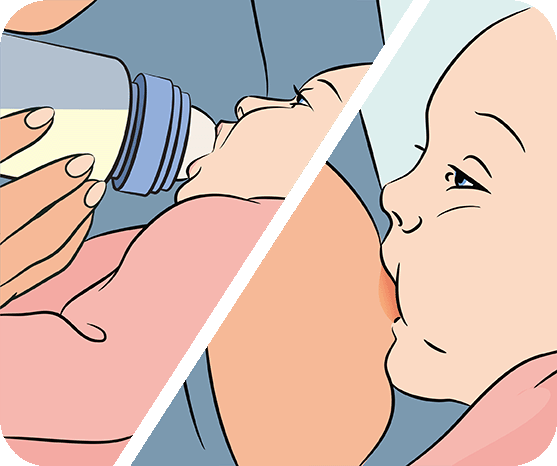Your newborn’s first week: what to expect
Your newborn spends her first week feeding, sleeping and bonding with you. You can bond with your newborn by spending time cuddling, talking and smiling. If you are concerned about your baby, seek advice from your doctor or nurse.
Your newborn spends her first week feeding, sleeping and bonding with you. You can bond with your newborn by spending time cuddling, talking and smiling. If you are concerned about your baby, seek advice from your doctor or nurse.
Colic: what to do
All babies cry. It’s a normal part of development. When babies cry a lot, it’s often called colic. Here are some things you can do if you think your baby has colic.
All babies cry. It’s a normal part of development. When babies cry a lot, it’s often called colic. Here are some things you can do if you think your baby has colic.
Gasovi i podrigivanje kod novorođenčeta: u slikama
Burping newborns: the basics
 New
NewBurping newborns: the basics
New
Cradle cap
Cradle cap is the oily, scaly crust that babies sometimes get on their scalps, in their body folds and on their torsos. Although cradle cap looks uncomfortable, it doesn’t usually bother your baby. It begins soon after birth and can last for up to 12 months.
Cradle cap is the oily, scaly crust that babies sometimes get on their scalps, in their body folds and on their torsos. Although cradle cap looks uncomfortable, it doesn’t usually bother your baby. It begins soon after birth and can last for up to 12 months.
Taking your child’s temperature
The best way to check your child’s temperature is with a digital thermometer. Digital probe thermometers are the most accurate. They measure temperature under the tongue or armpit and sometimes rectally. Ear thermometers and temporal artery thermometers are easy to use but can be inaccurate.
The best way to check your child’s temperature is with a digital thermometer. Digital probe thermometers are the most accurate. They measure temperature under the tongue or armpit and sometimes rectally. Ear thermometers and temporal artery thermometers are easy to use but can be inaccurate.
Fever
Fever is a temperature higher than 38°C. It’s usually a sign of infection. Fevers in newborns and very young babies are serious and need medical attention. Most fevers in children don’t require medical attention. Keep children hydrated and give them pain medication if they’re uncomfortable.
Fever is a temperature higher than 38°C. It’s usually a sign of infection. Fevers in newborns and very young babies are serious and need medical attention. Most fevers in children don’t require medical attention. Keep children hydrated and give them pain medication if they’re uncomfortable.
Serious childhood illnesses: 0-3 years
Call an ambulance if your child has symptoms like drowsiness, difficulty breathing, pale or blue skin, seizures or a rash that doesn’t fade. Go to emergency if your newborn has a fever, or your baby or child is feeding poorly, vomiting a lot and/or weeing less than usual.If you’re not sure whether your child is really sick, trust your instincts. You know your child best.
Call an ambulance if your child has symptoms like drowsiness, difficulty breathing, pale or blue skin, seizures or a rash that doesn’t fade. Go to emergency if your newborn has a fever, or your baby or child is feeding poorly, vomiting a lot and/or weeing less than usual.If you’re not sure whether your child is really sick, trust your instincts. You know your child best.
Medications for children: a guide
Children’s medicines are designed for children’s bodies. Ask your doctor or pharmacist about which medicines are right for your child. Always check dosage instructions before giving medicine to your child. Call the Poisons Information Centre if you think your child has accidentally taken medication or has taken the wrong dose.
Children’s medicines are designed for children’s bodies. Ask your doctor or pharmacist about which medicines are right for your child. Always check dosage instructions before giving medicine to your child. Call the Poisons Information Centre if you think your child has accidentally taken medication or has taken the wrong dose.
Coping with the neonatal intensive care unit (NICU): 18 tips
A neonatal intensive care unit (NICU) can be a strange and difficult environment for your baby, you and your family.Try making the NICU space your own, spending time with your baby, and taking time to relax.If you look after yourself while your baby is in the NICU, you’ll be better able to care for your baby.
A neonatal intensive care unit (NICU) can be a strange and difficult environment for your baby, you and your family.Try making the NICU space your own, spending time with your baby, and taking time to relax.If you look after yourself while your baby is in the NICU, you’ll be better able to care for your baby.
The neonatal intensive care unit (NICU): what to expect
NICUs have highly trained medical and nursing staff and special equipment to care for premature babies and sick newborns. Each baby is closely monitored by an individual bedside nurse and other specialists. Most hospitals are family friendly and aim to involve parents.
NICUs have highly trained medical and nursing staff and special equipment to care for premature babies and sick newborns. Each baby is closely monitored by an individual bedside nurse and other specialists. Most hospitals are family friendly and aim to involve parents.